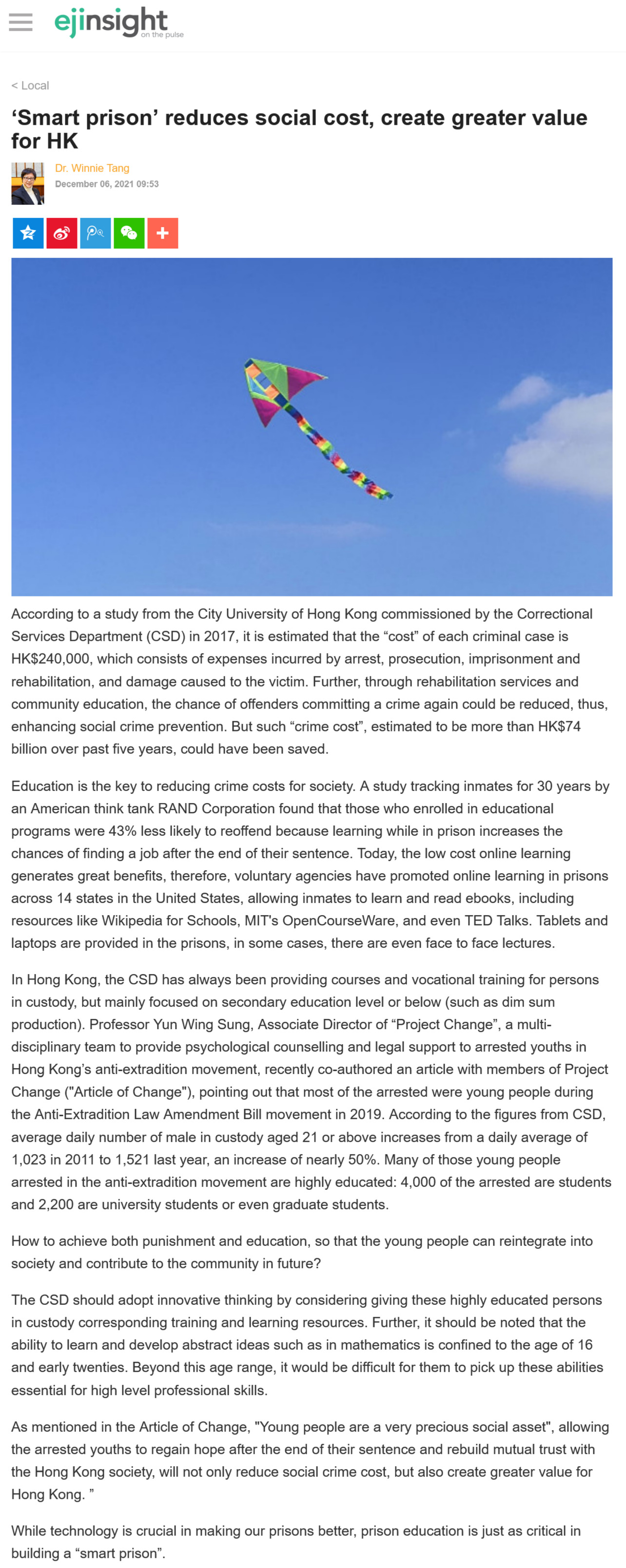網上版請按此

'Smart prison' reduces social cost, create greater value for HK
According to a study from the City University of Hong Kong commissioned by the Correctional Services Department (CSD) in 2017, it is estimated that the "cost" of each criminal case is HK$240,000, which consists of expenses incurred by arrest, prosecution, imprisonment and rehabilitation, and damage caused to the victim. Further, through rehabilitation services and community education, the chance of offenders committing a crime again could be reduced, thus, enhancing social crime prevention. But such "crime cost", estimated to be more than HK$74 billion over past five years, could have been saved.
Education is the key to reducing crime costs for society. A study tracking inmates for 30 years by an American think tank RAND Corporation found that those who enrolled in educational programs were 43% less likely to reoffend because learning while in prison increases the chances of finding a job after the end of their sentence. Today, the low cost online learning generates great benefits, therefore, voluntary agencies have promoted online learning in prisons across 14 states in the United States, allowing inmates to learn and read ebooks, including resources like Wikipedia for Schools, MIT's OpenCourseWare, and even TED Talks. Tablets and laptops are provided in the prisons, in some cases, there are even face to face lectures.
In Hong Kong, the CSD has always been providing courses and vocational training for persons in custody, but mainly focused on secondary education level or below (such as dim sum production). Professor Yun Wing Sung, Associate Director of "Project Change", a multi-disciplinary team to provide psychological counselling and legal support to arrested youths in Hong Kong’s anti-extradition movement, recently co-authored an article with members of Project Change ("Article of Change"), pointing out that most of the arrested were young people during the Anti-Extradition Law Amendment Bill movement in 2019. According to the figures from CSD, average daily number of male in custody aged 21 or above increases from a daily average of 1,023 in 2011 to 1,521 last year, an increase of nearly 50%. Many of those young people arrested in the anti-extradition movement are highly educated: 4,000 of the arrested are students and 2,200 are university students or even graduate students.
How to achieve both punishment and education, so that the young people can reintegrate into society and contribute to the community in future?
The CSD should adopt innovative thinking by considering giving these highly educated persons in custody corresponding training and learning resources. Further, it should be noted that the ability to learn and develop abstract ideas such as in mathematics is confined to the age of 16 and early twenties. Beyond this age range, it would be difficult for them to pick up these abilities essential for high level professional skills.
As mentioned in the Article of Change, "Young people are a very precious social asset", allowing the arrested youths to regain hope after the end of their sentence and rebuild mutual trust with the Hong Kong society, will not only reduce social crime cost, but also create greater value for Hong Kong. "
While technology is crucial in making our prisons better, prison education is just as critical in building a "smart prison".
Dr. Winnie Tang
Adjunct Professor, Department of Computer Science, Faculty of Engineering; Department of Geography, Faculty of Social Sciences; and Faculty of Architecture, The University of Hong Kong